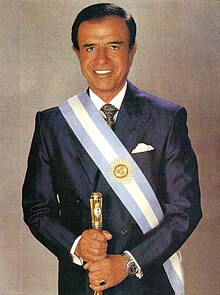Carlos Menem
| Carlos Menem | |
|---|---|

Official presidential portrait of Menem
|
|
| President of Argentina | |
|
In office July 8, 1989 – December 10, 1999 |
|
| Vice President |
Eduardo Duhalde (1989–1991) None (1991–1995) Carlos Ruckauf (1995–1999) |
| Preceded by | Raúl Alfonsín |
| Succeeded by | Fernando de la Rúa |
| National Senator of Argentina | |
|
Assumed office December 10, 2005 |
|
| Constituency | La Rioja |
| Governor of La Rioja | |
|
In office December 10, 1983 – July 8, 1989 |
|
| Vice Governor | Bernabé Arnaudo |
| Preceded by | Guillermo Jorge Piastrellini (de facto) |
| Succeeded by | Bernabé Arnaudo |
|
In office May 25, 1973 – March 24, 1976 |
|
| Preceded by | Julio Raúl Luchesi (de facto) |
| Succeeded by | Osvaldo Héctor Pérez Battaglia (de facto) |
| Personal details | |
| Born |
Carlos Saúl Menem July 2, 1930 Anillaco, La Rioja |
| Nationality | Argentine |
| Political party | Justicialist |
| Spouse(s) |
Zulema Yoma (1966–91) (divorced) Cecilia Bolocco (2001–11) (divorced) |
| Relations | Saúl Menem Mohibe Akil |
| Children | 4, including Zulema María Eva Menem |
| Profession | Lawyer |
| Religion | Roman Catholic (previously Islam) |
| Signature | |
Carlos Saúl Menem (born July 2, 1930) is an Argentine politician who was President of Argentina from 1989 to 1999. He has been a Senator for La Rioja Province since 2005.
Born in Anillaco, he became a Peronist during a visit to Buenos Aires. He led the party in his home province of La Rioja, and was elected governor in 1973. He was deposed and detained during the 1976 Argentine coup d'état, and was elected governor again in 1983. He defeated the Buenos Aires governor Antonio Cafiero in the primary elections for the 1989 presidential elections, which he won. Hyperinflation forced outgoing president Raúl Alfonsín to resign early, shortening the presidential transition.
Menem supported the Washington Consensus, and tackled inflation with the Convertibility plan in 1991. The plan was complemented by a series of privatizations, and was a success. Argentina re-established diplomatic relations with the United Kingdom, suspended since the 1982 Falklands War, and developed special relations with the United States. The country suffered two terrorist attacks. The Peronist victory in the 1993 midterm elections allowed him to force Alfonsín to sign the Pact of Olivos for the 1994 amendment of the Argentine Constitution. This amendment allowed Menem to run for re-election in 1995, which he won. A new economic crisis began, and the opposing parties formed a political coalition that won the 1997 midterm elections and the 1999 presidential election.
Menem ran for the presidency again in 2003, but faced with a likely defeat against Néstor Kirchner, he chose to give up between the two rounds of the election. He was elected senator for La Rioja in 2005.
...
Wikipedia
